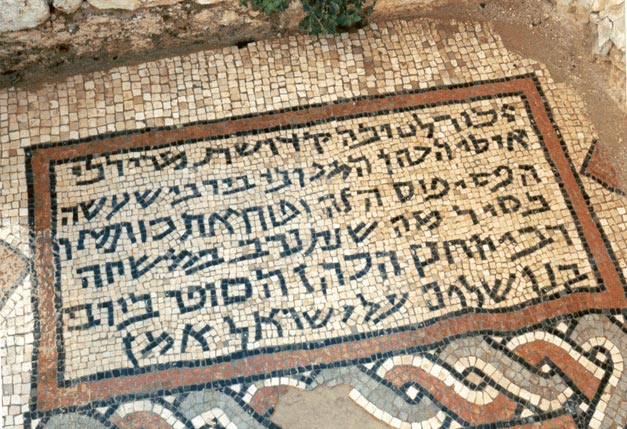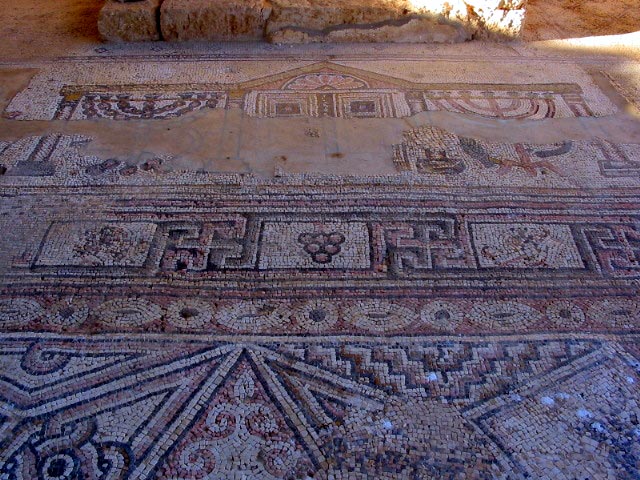An international campaign is being conducted against Israel regarding a small number of Palestinian houses and other structures near Susiya in the southern Mt. Hebron area. Susiya is located in Area C, the part of the West Bank in which - according to long-standing agreements between Israel and the Palestinian Authority, including the Oslo agreements - Israel has full responsibility for the enforcement of planning and zoning laws.
These clusters of structures, which were built illegally and adjacent to an ancient Jewish archeological site, are the subject of an ongoing examination by Israel's Supreme Court. The petitioners include the alleged owners of the illegal structures.
 Mosaic dedication plaque at Susiya synagogueCourtesy Susiya Tourism Center
Mosaic dedication plaque at Susiya synagogueCourtesy Susiya Tourism Center Mosaic floor at Susiya synagogueCourtesy Susiya Tourism Center
Mosaic floor at Susiya synagogueCourtesy Susiya Tourism CenterContrary to Palestinian claims that these structures have been permanently inhabited for decades, in fact, only a handful of families resided there in the 1980s and they only used the structures on a seasonal basis.
During the years while the legal proceedings were ongoing, the petitioners continued to expand their illegal construction, raising the number of structures to a few dozen. They exploited a cease and desist order that temporarily prevented Israel from demolishing the illegal structures.
On 4 May 2015, the Supreme Court declined to issue another temporary injunction preventing demolitions. The Court found that the petitioners chose to continue to build illegally in violation of judicial rulings that were meant to facilitate the examination of the situation in its entirety, including the actions of the Israeli authorities.
Following the Supreme Court's decision in May, Israel has decided to remove only those structures that were constructed in defiance of judicial rulings or by the exploitation of judicial orders. Israel has undertaken not to demolish the remaining illegal structures before the Supreme Court renders its decision and then only with the Court's permission. The Court will hear arguments from both sides of the case in August 2015.
Even if the petitioners lose the case, they will not be rendered homeless. Israel recognizes their traditional lifestyle and has proposed solutions that are appropriate to their special needs. They have been offered plots of similar, or even better, quality in a nearby area that already conforms to planning and zoning laws. Building houses there will also improve the petitioners' quality of life, giving them access to infrastructure and educational facilities that are not available in their current illegal locations. Additionally, they will be allowed to continue the same agricultural activities on the lands they currently claim.
On Juy 30, Israel's Supreme Court decided to postpone its hearing related to the illegal construction in Susiya that was supposed to take place on 3 August. The Court ordered the parties to update it in 60 days regarding the dialogue between the sides.
The Supreme Court's decision was given following a joint statement from the State Attorney and the petitioners requesting the delay as the sides are meeting to try and see if the situation can be resolved through direct dialogue.